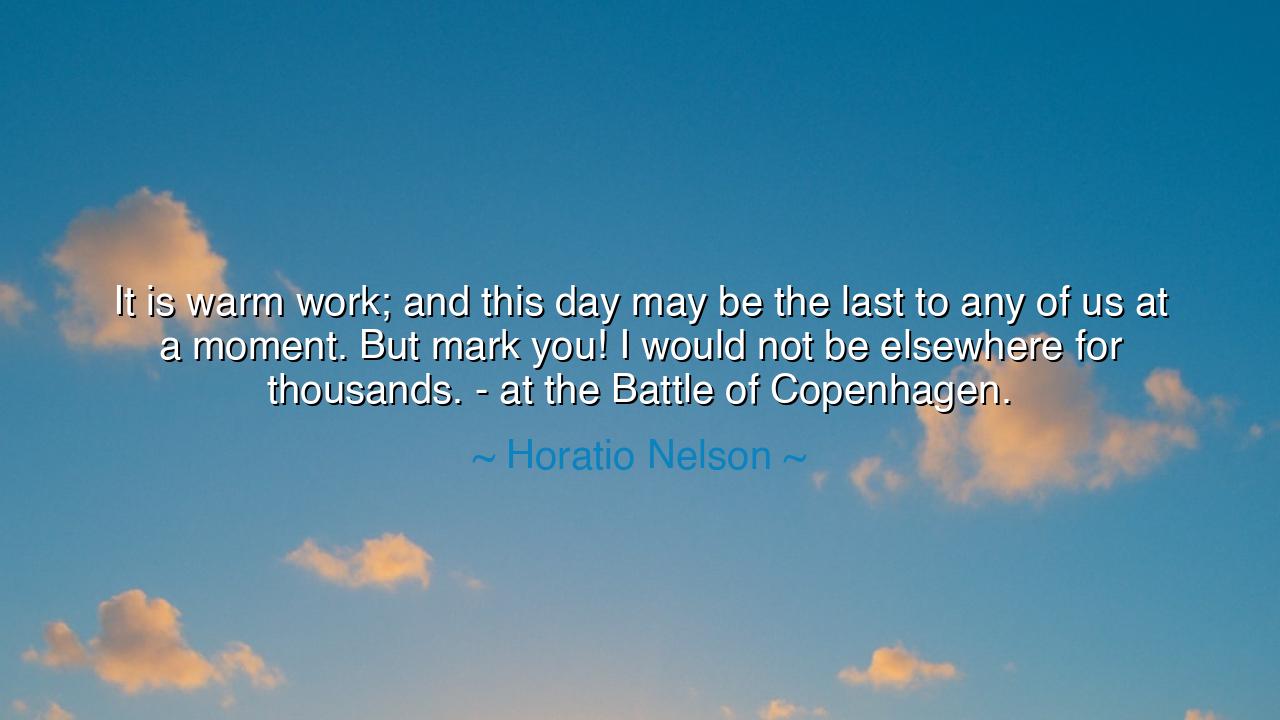
It is warm work; and this day may be the last to any of us at a
It is warm work; and this day may be the last to any of us at a moment. But mark you! I would not be elsewhere for thousands. - at the Battle of Copenhagen.






In the fiery words of the admiral, “It is warm work; and this day may be the last to any of us at a moment. But mark you! I would not be elsewhere for thousands.” Thus spoke Horatio Nelson amid the thunder of cannon and the smoke of war, at the Battle of Copenhagen. His voice was both fierce and tender, carrying the weight of mortality, yet blazing with devotion to duty and honor.
The phrase “warm work” reveals the heat of combat — the chaos where life hangs by a thread, and every breath may be the final one. Yet Nelson, standing among his men, did not shrink from the storm. He knew that death was near, yet he welcomed his place within it, for the fire of battle was also the fire of purpose. In this, he taught that true courage is not the absence of fear, but the embrace of one’s calling despite it.
The last day may come at any moment, he admits, but it is not to be feared if one stands in the place destiny has appointed. His declaration that he “would not be elsewhere for thousands” reveals the heart of loyalty: that no treasure, no comfort, no distant safety could equal the worth of standing with one’s comrades in the hour of trial. Here lies the essence of devotion — to choose honor over ease, and fellowship over fortune.
The origin of this truth rests in Nelson’s own life, carved by the sea and sealed by sacrifice. The Battle of Copenhagen was not merely a contest of ships, but a trial of spirit, where men faced death for crown and country. Nelson’s words, spoken amid the roar, endure as testament to the ancient law: that the noblest place for a soul is not the soft refuge of comfort, but the hard ground where duty and courage meet.






THThu Trang Hoang
Horatio Nelson’s quote stands as a testament to his bravery and leadership. But it also speaks to the feeling of being fully immersed in the present, even under intense pressure. How do we bring that sense of purpose into our everyday lives? When faced with tough decisions, are we able to act with such clarity and confidence, or do we hesitate, unsure of our commitment?
LPLy Phan
Nelson’s statement seems to capture the spirit of sacrifice and duty. He was willing to be where the action was, fully aware of the risks. But how often do we, in our own lives, face moments of danger or challenge and wonder whether it’s worth it? What drives us to push forward, especially when the stakes feel high? Is it just the desire for success, or something deeper like loyalty or love for a cause?
DCDuongna Cao
Reading Horatio Nelson’s words makes me reflect on the meaning of true bravery and commitment. He wasn’t just facing physical danger at the Battle of Copenhagen; he was showing a deep sense of purpose. How often do we push ourselves to stand firm in our decisions, even when faced with significant risks? Is that the essence of leadership, and can it be replicated in less extreme circumstances?
GDGold D.dragon
Nelson’s quote is powerful, especially the way he reflects on being exactly where he wants to be despite the obvious dangers. It raises an interesting question—what is it about certain people or moments that make us feel so sure about where we are in life, even when faced with uncertainty? Does the conviction to be where you are come from a place of duty, pride, or just pure passion?
HPtran huu phuoc
Horatio Nelson’s words highlight an intense moment of courage and commitment. His willingness to face danger with such conviction, even knowing the battle could be his last, is inspiring. But it also makes me think about the risks we take in our own lives—what drives us to take these risks? Is it duty, passion, or something else entirely? Can we ever truly understand that kind of dedication until we are in similar circumstances?